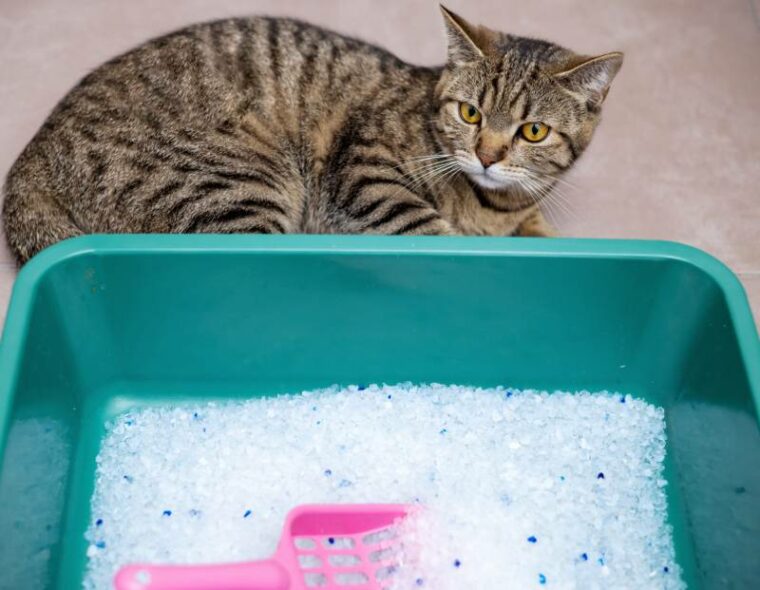
Cats are extremely clean animals that are easily housetrained, which is why it’s so surprising when they suddenly go outside the litter box. If your cat is doing this and you would like to figure out why, keep reading as we list several possible reasons, along with several tips for getting things back to normal.
The 14 Reasons That Your Cat Misses the Litter Box
1. Illness
Cats may sometimes miss the litter box due to illness, as it might be too difficult to get into or too painful. Your cat may also not have time to reach the litter box, like when they are experiencing diarrhea. If you observe blood in your cat’s urine or notice that their urine appears cloudy or discolored, this may indicate a urinary tract issue. If your cat appears to be in pain, straining, or making distressing vocalizations while trying to urinate, it could be a sign of a urinary tract infection or blockage. It is vital that you seek veterinary attention urgently if your cat is unproductively straining in the litter box i.e. if nothing is coming out. A blocked urinary tract is an absolute emergency and is more common in young, overweight, male cats, but it can happen to any cat.
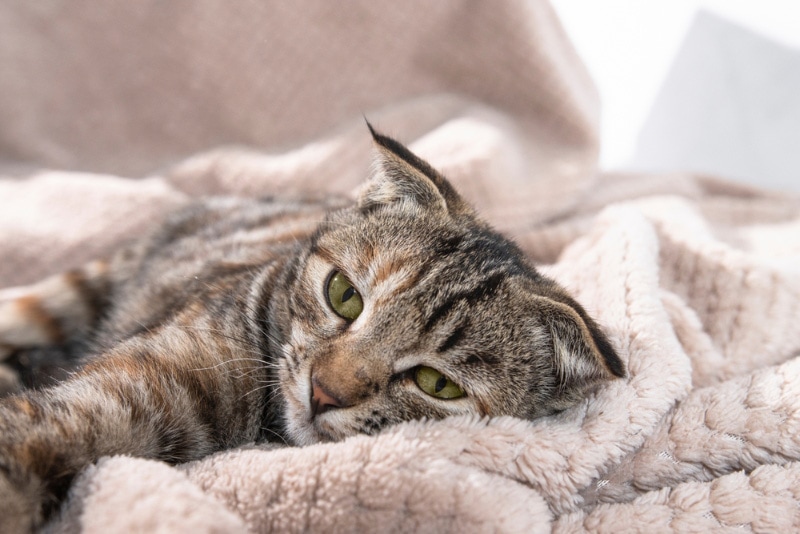
What Can You Do About It?
If you notice your cat showing signs of illness and it’s causing them to miss the litter box, you must schedule a visit to the veterinarian as soon as possible to get a diagnosis and begin treatment. If you have multiple cats, isolate the sick cat in a separate room with a litter box, food, and water to help reduce stress and prevent potential conflicts with the other cats. This will also allow you to monitor the cat of concern more closely, and allow you to assess if the cat is passing urine successfully and if it looks normal. If your cat is having fecal accidents you’ll be able to examine the feces, knowing which cat it is coming from. The more information you can give to your vet, the better. Clean up accidents quickly with an enzymatic cleaner to prevent the cat from returning to the same spot.
2. Location
Cats are routine-based animals that do things with decisive regularity. Therefore, if you move their litter box to a new location in your house, it can take them a while to find it and adjust to the new placement, which could result in a few accidents as your cat transitions to a new routine. Your cat might also have a problem with where you put it and refuse to use it, as felines can be quite picky. Cats like to have a litter tray each plus one extra, and they like them to be located away from their water and feeding areas.
What Can You Do About It?
Place the litter box in a quiet, low-traffic area where your cat can have privacy, and ensure that the litter box is easily accessible, especially for older or less-agile cats, and place it away from food and water bowls. Minimize sources of stress near the litter box, such as loud noises, other pets, or obstructions that might make your cat feel trapped. You can also try moving the litter box gradually, a few inches each day, until you get it to the final location without upsetting your pet.
3. Cleanliness
Cats are clean animals that may refuse to use the litter box if it’s too dirty. In fact, many owners will tell you that their pet is most likely to use it within a few minutes of cleaning. If you spend a great deal of time away from home or have several cats, the litter box can easily get too dirty for your cat, which might result in them missing it or preferring the floor instead!.

What Can You Do About It?
Make it a habit to spot clean the litter box daily to remove waste and completely change the litter in the box at least once a week. If you have more than one cat it may need cleaning out completely more often than once weekly. Clumping litter makes it easier to scoop out waste daily and maintain a clean litter box, and you should periodically clean the entire litter box with mild, unscented soap and water. If you have more than one cat, provide enough litter boxes for each cat, plus one extra, and place them in different locations away from their food. The litter in the box should be about 2 inches deep.
4. Simple Dislike
Cats are picky animals, and if they don’t like something, they won’t go near it, and it can be impossible to change their minds. If you recently purchased a new litter box and now your cat is repeatedly urinating or defecating outside of it, there could be something about it your cat doesn’t like, especially if you are using an automatic box or one that has a lid. Even changing the substrate can make a difference, so if you’ve changed what type of litter you use just before your cat has started missing the box, you might want to consider reverting back to the old litter type.
What Can You Do About It?
Some cats have preferences for the style and size of their litter box. Experiment with various shapes, sizes, and entry types to see what your cat prefers. Although they can be convenient, automatic models can make noises that might scare your cat, especially at first. Litter box liners can also make a rustling sound when cats step on them, so although they make cleaning the tray easier, we recommend avoiding them if your cat is suddenly missing the box. Litter boxes with lids can condense odors, making them less pleasurable for your pet, especially if you have more than one cat or use a fragrant brand of litter.
5. Too Young
If your cat is smaller than average or is still a kitten, they might be too small to get inside, resulting in them missing the litter box. They may also lack the experience required to use it.

What Can You Do About It?
Make sure the litter box is the right size for your kitten. A smaller, shallower box can be easier for a young kitten to access. Select a litter that is safe and comfortable for kittens. Most clumping or non-clumping clay litters are suitable, but you can consult with your veterinarian for recommendations. You might also consider using kitten-specific litter or a litter attractant to make the litter box more appealing to your kitten and get them used to using it.
6. Size
If the litter box is too small for your cat to use comfortably, there is a good chance that they will avoid it or just miss it completely as they use it. It’s a common problem for large cats and easy to overlook because many owners don’t know how much room they need.
What Can You Do About It?
The most straightforward solution is to select a litter box that accommodates your large cat comfortably. Look for a box that provides ample space for them to move around. A high-sided litter box can help contain litter and prevent it from spilling over the sides, which can be particularly useful if you have a big cat that digs vigorously. An open-top litter box with a low entry point can also make it easier for them to access and use the box.
7. Too Busy
Cats are private animals that prefer to do their business out of view and may not like sharing their litter box with other cats. If the litter box gets too much traffic, your cat might refuse to use it and instead relieve themselves in an inappropriate area.

What Can You Do About It?
Ensure that you have enough litter boxes for the number of cats in your household. The general guideline is to have one litter box per cat, plus one extra, to give each cat their designated space for elimination. Place the litter boxes in different, accessible locations throughout your home to prevent overcrowding in one area. Keep the litter boxes clean by scooping waste daily and changing the litter regularly. Some cats will avoid a dirty box, which could cause crowding at another.
8. Pain
If your cat has an injury on their paws or musculo-skeletal problems such as osteoarthritis, getting into the litter box and into position for elimination can be tricky and painful, sometimes resulting in them not burying their waste or missing the tray altogether. Even cats without mobility issues and with healthy paws may struggle with certain types of litter, like diatomaceous earth or crushed walnut shells, which can have sharp edges.
What Can You Do About It?
If your cat has sore paws due to being declawed, they will likely remain tender. If you think that the soreness is due to something else, examine their paws for any signs of injury, cuts, abrasions, or foreign objects. If you see any visible issues, consult your veterinarian for guidance on how to treat them. Replace the regular litter with a soft, non-abrasive litter, such as paper-based or wheat-based varieties, which will be gentler on your cat’s sore paws. Consider using a shallow litter box that your cat can easily step into and out of without causing additional discomfort. If you know your cat has mobility issues, a larger litter tray with low sides is better for them.
9. Outdoor Distractions
Cats with access to the outdoors might be more prone to missing the litter box, especially if they have started to prefer outdoor spots for elimination or if they are distracted by the outside world.

What Can You Do About It?
If your cat is easily distracted by birds, squirrels, or other animals while they are using the litter box, you may need to move it to another part of your home. Once cats are allowed outside, they usually prefer to use the outside to relieve themselves, so they might get out of practice when asked to use a litter tray again. Cats that aren’t well may start to use the litter tray again, even if they have access to the outdoors, because it is closer and easier for them.
10. Change in Routine
Cats stick closely to their routine, and any disruption can have unexpected consequences. If you have recently changed their feeding times, litter, box location, or something else, there is a good chance that they are experiencing an adjustment period that could result in them missing the litter box. Change in routine can also cause cats considerable stress which can predispose them to stress-related cystitis, a common reason for cats urinating outside of the litter box. So, it is often best to get your cat checked by your vet if you notice these changes.
What Can You Do About It?
In many cases, your cat will adjust to the new way of things after a few days, as long as things don’t keep changing and they can establish a new routine. However, if your cat is having an especially hard time, you can try switching things back if possible and transitioning to the new way more slowly. Pheromone plug-ins can be useful at times of change to help reduce stress in cats.
11. Old Age
Unfortunately, as cats age, their cognitive abilities may start to decline, and they may start to experience signs similar to those of dementia in humans, resulting in them missing the litter box or forgetting where it is altogether. It can also be difficult for older cats to get in and out of the litter box.
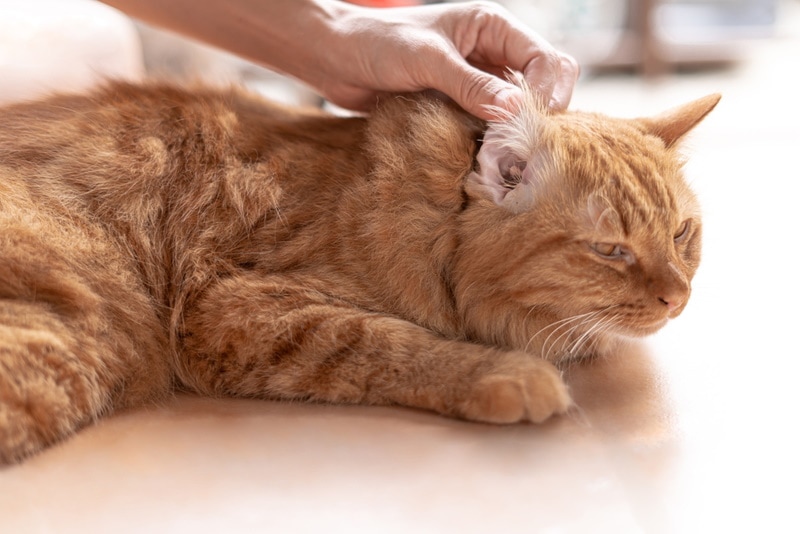
What Can You Do About It?
Select a litter box with low sides or a cutout entrance that is easy for your senior cat to step into. Avoid high-sided or covered boxes that may be difficult for them to access. Place multiple litter boxes in different accessible locations throughout your home so they won’t need to travel so far to reach the box, and keep them clean so your pet will be more likely to use them. It can also be a good idea to experiment with different litter materials to find one that your senior cat is comfortable with, as some older cats may prefer softer or more granular litter. If you notice changes to your older cat’s urination habits or drinking habits, it can be a sign that something medical is wrong, so seek veterinary advice as soon as possible.
12. Behavioral Issue
Cats have few ways to communicate with their human owners, especially concerning their discontent. In some cases, if your cat is stressed by a change to the house layout, a change to your routine i.e.you spending more time away from home, a new pet in the house, or another issue that’s causing them anxiety, they may choose to relieve themselves outside the box.
What Can You Do About It?
Before assuming the issue is purely behavioral, consult your veterinarian to rule out any underlying medical problems. Identify any potential stressors in your cat’s environment, and create a safe place away from the situation if possible. Increase the number of litter boxes and if there is an obvious stressor, such as a new cat in the house, or street, you will need to manage this accordingly. Litter attractants may help make the litter box more appealing to your cat, and praise and reward them when they use it correctly, to help improve their behavior.
13. Scent Residue
If a cat has previously soiled an area outside the litter box, the residual scent may attract them back to that spot, leading to repeated accidents.
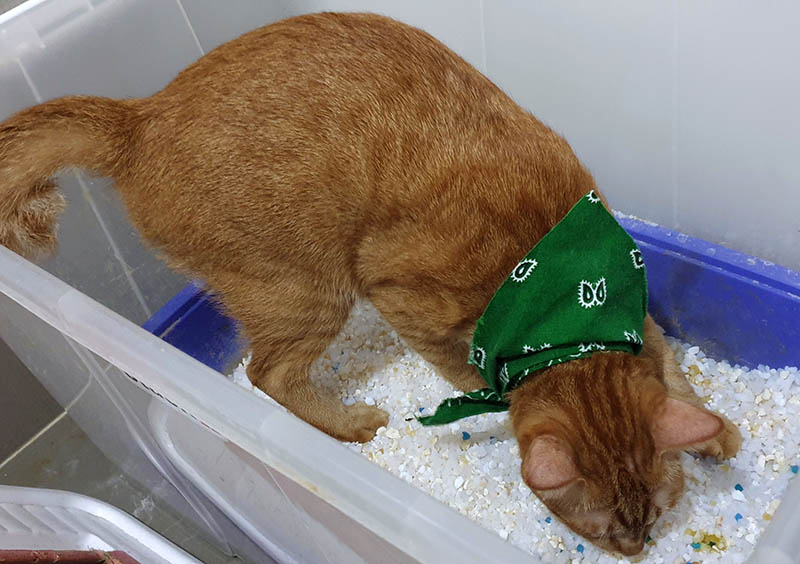
What Can You Do About It?
The best way to remove residual scents is to use a stain and odor removing cleaner that contains enzymes (proteins that target specific substrates, and break them down) to destroy the organic material responsible for the scent at the source.
14. Not Spayed or Neutered
Cats that haven’t been spayed or neutered can exhibit specific behaviors related to sexual maturity that may affect their litter box habits. This behavior can include territorial marking and increased territorial behaviors.
What Can You Do About It?
The most effective way to address behavioral issues related to sexual maturity is to have your cat spayed or neutered, which can significantly reduce territorial marking. Scent marking isn’t a litter box problem, it is related to sexual maturity and a need to mark territory. The drive to scent mark is reduced by neutering a cat, but it doesn’t always stop it entirely. Consult your veterinarian to ensure that your cat is healthy and eligible for the procedure, and monitor their behavior and litter box habits afterward. It may take a while for the effects of the procedure to influence their behavior fully.
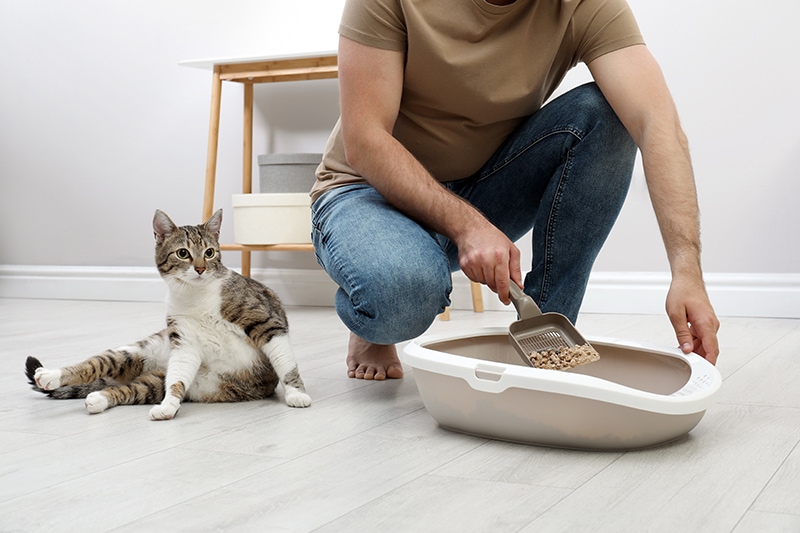
Tips for Promoting Proper Litter Box Habits
 Summary
Summary
There can be several reasons that your cat is missing the litter box. These include health issues, injuries to their paws and mobility problems, so examine them carefully, and schedule an appointment with the vet to rule out any problems. Other common issues are stress, a dirty litter box or one that too many cats frequent. Adding more litter boxes to your home can help reduce traffic in one area and help the cats feel more relaxed. If a cat is too large for a litter box or has difficulty turning around, they may miss it without intending to. Most experts recommend choosing a litter box that is at least 1.5 times the length of your cat for the best results.
If you try many of the tips on this list with no change, a feline behaviorist may be able to help you determine any underlying issues so you can start making progress.
See also:
- What Kinds of Bones Can Dogs Eat? 3 Vet-Approved Options
- Why Do Cats Get the Zoomies After They Poop? 5 Vet-Reviewed Reasons
Featured Image Credit: Alexandra Morosanu, Shutterstock






